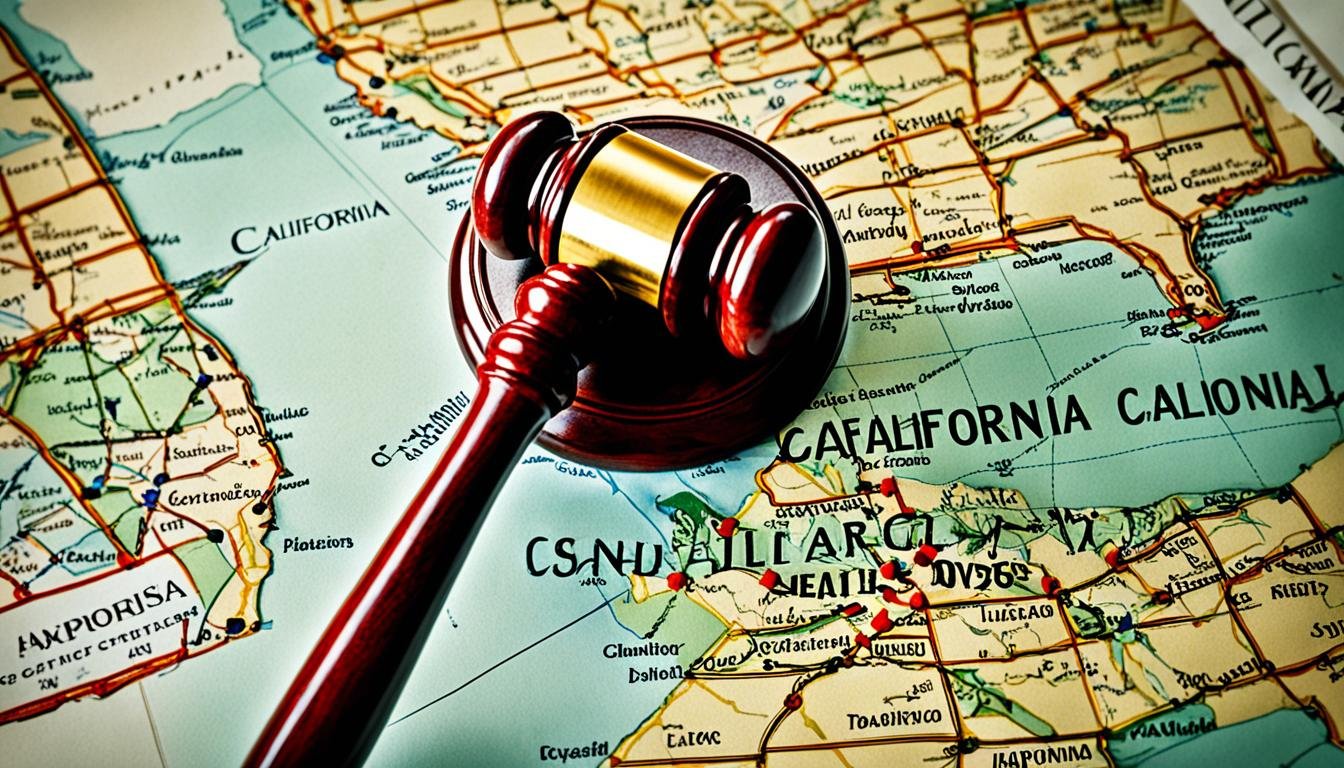In California, child custody orders can change many times before a child grows up1. This can happen if a child’s needs change, if the agreement isn’t followed, or if the child asks for it. If you’re a parent, dealing with these changes can be tough. But, with the right help, you can make sure your child’s needs are met.
Key Takeaways
- In California, child custody orders can change multiple times before a child reaches adulthood.
- Common reasons for modifying a custody agreement include changes in the child’s needs, non-compliance, or the child’s request.
- Filing a Request for Order (Form FL-300) is the first step in the modification process.
- The court process involves mediation and potentially a trial if an agreement cannot be reached.
- An experienced attorney can guide you through the complexities of custody modifications in California.
Understanding Child Custody Modifications in California
In California, child custody agreements can change. Parents can ask for changes if things change and the current order doesn’t work for the child2. This could be because the child’s needs change, a parent’s work schedule changes, or if there are issues like abuse or neglect2.
When Can I Modify a Child Custody Agreement?
As children grow, their needs change. This might mean changing custody arrangements to fit the new situation, like spending more time with one parent2. If a parent moves, this can also lead to changes in custody in California. The court looks at how the move affects the child, their relationship with both parents, and why the move is happening2.
Changes in a parent’s work schedule might mean a custody change too. This is to make sure the child’s needs are still met, especially if the parent’s schedule doesn’t fit the old arrangement anymore2.
Parental alienation, where one parent tries to turn the child against the other, can lead to custody changes. This is often done through court-ordered counseling to protect the child2. Abuse or neglect can also lead to quick legal action, like getting restraining orders or emergency custody, to keep the child safe and change the custody agreement2.
At times, both parents might agree to change the custody arrangement on their own. This is if the current setup isn’t working or if changes are needed to better suit the child’s needs2.
What Constitutes a Significant Change of Circumstances?
In California, a “significant change in circumstances” is needed to change an existing custody order, as per the Montenegro v. Diaz standard3. Also, in many places, parents must go to mediation before a custody case goes to court3. If both parents agree on custody changes, a judge’s signature on a stipulation will make the changes official3.
Talking to experienced family law lawyers in California is key. They help protect parents’ rights and make sure the child’s best interests are looked after when changing custody agreements. This covers issues like the child’s welfare, parental schedules, or moving2.

The Process of Requesting a Custody Modification
When you want to change a child custody agreement in California, you need to follow certain steps. First, you must fill out important forms like Form FL-300 (Request for Order) and Form FL-311 (Child Custody and Visitation)4. These forms ask for details about both parents and the child. This helps the court understand the situation4.
Preparing the Necessary Forms
It’s crucial to fill out these forms correctly to avoid delays4. Many families work with lawyers from places like businesslawyersirvine.com and the Super Attorneys Of Irvine. These lawyers help with the legal parts and make sure everything is done right4.
Filing the Forms and Serving the Other Parent
After filling out the forms, you need to file them with the court and serve the other parent. This means giving the documents to the other party so they know about the custody change request5. In many places in California, you must try mediation before a judge will hear your case5. The court might also want you and the other parent to try to agree through mediation before making a final choice5.
By doing things right and getting help from skilled lawyers, parents can go through the custody change process better. This can help them get a good result for their family4.

“The reviews show many clients are very happy. They thank the firm’s lawyers for their knowledge.”4
Modifying child custody California: The Court Process
Mediation and Negotiation
In California, when you want to change child custody, the court makes parents go to mediation6. This process helps parents, with their lawyers and a court supervisor, agree on changes6. It aims to lessen conflict and save time, money, and stress6.
If mediation doesn’t work, the case goes to a judge7. The judge looks at the forms and evidence to see if changing custody is best for the child7. Changing custody is hard because the court wants to keep the child stable7.
Parents must show a big change that affects the child’s life7. For low-income families, groups like the Legal Aid Society offer legal help6. Also, the California bar associations provide free or low-cost legal advice6.
Family and Children’s Services offer counseling and support during custody changes6. Parents Without Partners also gives emotional support6. It’s key to have good legal help, like the Super Attorneys Of Irvine, in California’s complex custody process8.
| Custody Modification Process | Key Considerations |
|---|---|
| Filing the Custody Modification Request | |
| Court-Ordered Mediation | |
| Judicial Review |
“Seeking reliable legal representation is essential when navigating the complex family law system in cases of divorce, child custody, or other familial disputes.”8
Factors Considered by the Court
When looking at a custody change request, the main focus is on what’s best for the child. The court checks how well the child gets along with each parent. They look at the parents’ ability to offer a stable and caring home. They also consider how changing things might affect the child’s life9.
The court looks at the parents’ fitness and their ability to offer stability. This means checking their mental and physical health. They also see if they can meet the child’s needs and work together in raising the child10.
The Child’s Best Interests
Judges listen to what children 14 and older want if it’s good for them9. Moving is a common reason for changing custody, but courts rarely change it just for that9. They usually only switch custody if there’s a big issue with safety, health, or well-being9.
Parental Fitness and Ability to Provide Stability
The court thinks about the child and parents’ ages and health when making custody decisions10. California law lists things judges must think about, like financial support and emotional health10. They also look at the home’s stability and how it affects the child’s life, like school and activities10.
If a child is in danger or being abused, they need to be moved out fast9. If the dead parent wanted someone else to have custody, that person can ask the court for it9.
Temporary vs. Final Custody Orders
In California, knowing the difference between temporary and final custody orders is key11. Temporary orders are for urgent cases like child abuse and last until a lasting plan is made11. They can be set up quickly and last until the next hearing, usually within 20 days11.
Final custody orders are meant to last until the child turns 18 or gains legal independence11. These orders can come from agreements between parents or a judge’s decision11. To change a final order, parents must show a big change in situation and prove it’s best for the child12.
Temporary orders can affect final custody plans, so parents must be careful11. Some final orders include plans to increase visitation over time11. Keeping track of any order violations is important, as serious ones might mean calling the police or filing contempt charges11.
Understanding temporary and final custody orders in California takes a lot of legal knowledge and knowing what the court looks at12. By staying informed and following orders, parents can make the best choices for their kids11.
“Temporary orders provide short-term solutions, while final orders are intended to be permanent. Understanding the differences between the two is crucial for parents seeking custody modifications in California.”
The Role of an Attorney in Custody Modifications
Changing a child custody agreement in California can feel overwhelming. Working with a skilled family law attorney, like those at businesslawyersirvine.com or Super Attorneys Of Irvine, is crucial in the custody modification process13.
An attorney will help you understand the complex legal steps in filing for custody modification. They make sure you fill out all the forms correctly and follow the right steps. With their help, you’ll get legal advice to boost your case’s strength and improve your chances of success13.
They also represent you in mediation and court, fighting for what’s best for you and your child. They negotiate to get a custody arrangement that focuses on your child’s happiness14.
Getting an experienced family law attorney is key to a smooth custody modification process in California. Their deep knowledge of the law and the court system is crucial for a good outcome for you and your child13.
“Hiring a knowledgeable attorney can greatly increase your chances of a successful custody modification outcome.”
Having the right lawyer is essential for changing child custody in California. With a talented attorney, you can confidently go through the process and get the best arrangement for your family131415.
Conclusion
Changing a child custody agreement in California is complex but sometimes needed. It ensures the custody arrangement still works for your child as things change. Knowing the legal rules, the court process, and what the court looks at helps you go through the change process well. Having a skilled family law lawyer, like those at Super Attorneys Of Irvine, can also help get a good result for your child. If you need to change a custody order for big changes like moving or changes in your child’s needs, or if you’re facing issues like parental alienation or trouble co-parenting, a smart legal mind is key. With the right legal help and focusing on your child’s well-being, you can make it through the custody change process in California. This way, your child’s best interests stay the main focus.161718
FAQ
When can I modify a child custody agreement in California?
What constitutes a significant change of circumstances for a custody modification?
What forms do I need to file for a custody modification in California?
What is the process for modifying a child custody agreement in California?
How do temporary and final custody orders differ in terms of modification?
How can an attorney help with the custody modification process?
Source Links
- https://hannlawfirm.com/blog/how-do-i-modify-a-child-custody-agreement-in-california/
- https://www.modernfamilylaw.com/resources/top-reasons-why-child-custody-agreements-are-modified-in-california/
- https://www.silvadivorce.com/blog/modifying-child-custody-california/
- https://talkovlaw.com/how-to-change-a-child-custody-order-in-california/
- https://www.bvfamlaw.com/modifying-child-custody-agreements-in-california/
- https://www.dmartinlaw.com/blog/2023/october/modifying-child-custody-orders-in-california/
- https://www.wkfamilylaw.com/modification.shtml/
- https://www.ciancilaw.com/blog/can-you-modify-a-parenting-plan-without-going-to/
- https://ljdfamilylaw.com/child-custody-san-francisco-modification-factors/
- https://www.sachdevfamilylaw.com/blog/6-factors-that-affect-child-custody-decisions-in-california/
- https://www.custodyxchange.com/locations/usa/california/orders.php
- https://www.pasadenalawoffice.com/blog/2020/june/can-i-modify-my-custody-order-/
- https://childsupport.ca.gov/overview/modify-my-payment/
- https://www.occourts.org/self-help/self-help-family-law/child-custody
- https://www.whitmarshfamilylaw.com/child-custody-modification-attorney-los-angeles/
- https://www.forbes.com/advisor/legal/child-custody/reasons-judge-will-change-custody/
- https://www.mdilaw.com/blog/2023/august/how-to-modify-custody-orders/
- https://www.courts.ca.gov/1193.htm

